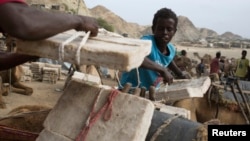In the year 2000, the United States Congress enacted and then-President Bill Clinton signed the sweeping legislation to support poverty alleviation and spur economic growth in Sub Saharan Africa.
Recognizing that economic growth alone will not eliminate poverty, the African Growth and Opportunity Act, or AGOA, requires that recipient countries make continual progress toward establishing protection of internationally recognized worker rights.
Strengthening workers’ rights in AGOA countries is vital to ensuring that the benefits of trade extend to all segments of the population and that workers and their communities are more able to benefit from stable incomes and rising standards of living.
For that reason, as part of the annual AGOA review process, the U.S. Department of Labor examines AGOA countries’ efforts to implement and enforce worker rights, including the right of association, the right to organize and bargain collectively, prohibitions on forced and compulsory labor, a minimum age for the employment of children, and acceptable conditions of work.
The Labor Department also funds technical assistance programs that support the strengthening of worker rights in Sub Saharan Africa. Since 1999, we have provided $291 million to support projects in 45 countries there that protect workers and reduce the worst forms of child labor. Almost $67 million in projects are under way in Sub-Saharan Africa to reduce the worst forms of child labor and promote worker rights.
To further highlight the link between expanded trade and increased protection of labor rights, at the annual AGOA Forum opening Monday in Addis Ababa, Ethiopia, the Labor Department will join a panel discussion on “Inclusive Economic Growth and Sustainable Development Strategies: Labor Perspectives & Best Practices.”
The U.S. State Department, the Government of Liberia and the International Labor Organization will also participate. The session will highlight the role that greater respect for labor rights can play in advancing inclusive economic growth.
We encourage you to share your own ideas with your government to make worker rights work in your country.
Recognizing that economic growth alone will not eliminate poverty, the African Growth and Opportunity Act, or AGOA, requires that recipient countries make continual progress toward establishing protection of internationally recognized worker rights.
Strengthening workers’ rights in AGOA countries is vital to ensuring that the benefits of trade extend to all segments of the population and that workers and their communities are more able to benefit from stable incomes and rising standards of living.
For that reason, as part of the annual AGOA review process, the U.S. Department of Labor examines AGOA countries’ efforts to implement and enforce worker rights, including the right of association, the right to organize and bargain collectively, prohibitions on forced and compulsory labor, a minimum age for the employment of children, and acceptable conditions of work.
The Labor Department also funds technical assistance programs that support the strengthening of worker rights in Sub Saharan Africa. Since 1999, we have provided $291 million to support projects in 45 countries there that protect workers and reduce the worst forms of child labor. Almost $67 million in projects are under way in Sub-Saharan Africa to reduce the worst forms of child labor and promote worker rights.
To further highlight the link between expanded trade and increased protection of labor rights, at the annual AGOA Forum opening Monday in Addis Ababa, Ethiopia, the Labor Department will join a panel discussion on “Inclusive Economic Growth and Sustainable Development Strategies: Labor Perspectives & Best Practices.”
The U.S. State Department, the Government of Liberia and the International Labor Organization will also participate. The session will highlight the role that greater respect for labor rights can play in advancing inclusive economic growth.
We encourage you to share your own ideas with your government to make worker rights work in your country.






